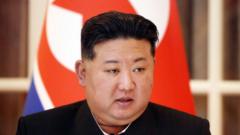The ongoing trade spat intensifies, highlighting vulnerabilities in global supply chains and potential ramifications for major industries.
U.S. Halts Key Exports to China Amid Escalating Trade Tensions

U.S. Halts Key Exports to China Amid Escalating Trade Tensions
Trump administration takes a tough stance on jet engine and semiconductor sales in response to China's export restrictions.
The Trump administration has announced a suspension of key exports to China, including essential technologies associated with jet engines, semiconductors, and selected chemicals. This decision follows China's recent move to restrict the export of critical minerals to the United States, a development perceived as a threat to U.S. supply chains by several insiders.
As the largest economies in the world inch closer to a confrontational "supply chain warfare," both Washington and Beijing are asserting their influence over vital economic resources, aiming to secure an advantage in the deepening trade conflict.
This escalation could have profound consequences for various sectors reliant on foreign technology, particularly manufacturers of aircraft, robotics, automobiles, and semiconductors. Furthermore, it complicates the ongoing discussions to resolve a trade dispute sparked by the administration's tariff measures.
In a recent negotiation on May 12, officials from both nations reached a consensus to suspend the stringent tariffs imposed on each other for a period of 90 days while searching for a more sustainable agreement. Treasury Secretary Scott Bessent noted that both delegations expressed a desire to avoid economic decoupling. Yet, the administration continues to tighten its grip on China through additional punitive actions, as Secretary of State Marco Rubio revealed on Wednesday the intent to "aggressively revoke" visas for Chinese students studying in critical fields or linked to the Chinese Communist Party.
Despite expectations from U.S. officials that China would ease its mineral export restrictions following the recent tariff negotiations, dissatisfaction appears to be mounting regarding China’s compliance.
As the largest economies in the world inch closer to a confrontational "supply chain warfare," both Washington and Beijing are asserting their influence over vital economic resources, aiming to secure an advantage in the deepening trade conflict.
This escalation could have profound consequences for various sectors reliant on foreign technology, particularly manufacturers of aircraft, robotics, automobiles, and semiconductors. Furthermore, it complicates the ongoing discussions to resolve a trade dispute sparked by the administration's tariff measures.
In a recent negotiation on May 12, officials from both nations reached a consensus to suspend the stringent tariffs imposed on each other for a period of 90 days while searching for a more sustainable agreement. Treasury Secretary Scott Bessent noted that both delegations expressed a desire to avoid economic decoupling. Yet, the administration continues to tighten its grip on China through additional punitive actions, as Secretary of State Marco Rubio revealed on Wednesday the intent to "aggressively revoke" visas for Chinese students studying in critical fields or linked to the Chinese Communist Party.
Despite expectations from U.S. officials that China would ease its mineral export restrictions following the recent tariff negotiations, dissatisfaction appears to be mounting regarding China’s compliance.























